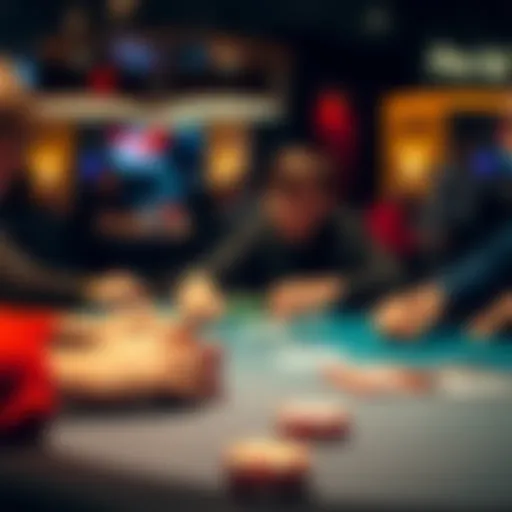Casinos in Utah: Regulations and Cultural Insights


Intro
Utah, a state known for its stunning landscapes and vibrant culture, presents a unique juxtaposition when it comes to the world of gambling. Unlike many neighboring states, Utah has stringent regulations governing the realm of casinos and gambling, creating an environment that is both fascinating and perplexing for both enthusiasts and casual observers.
The legal fabric of gambling in Utah is woven tightly with cultural threads that influence how residents view such activities. For many, the idea of casinos is married to negative perceptions, stemming from a strong cultural backdrop that fosters abstention from gambling. It is indeed a complex dance between tradition and modern gaming practices, be it through tribal ventures, limited lotteries, or the growing sphere of online gambling alternatives.
Understanding the delicate balance of regulations and cultural attitudes in Utah lays the groundwork for exploring the state's gaming landscape. Here, clarity on the options available can often seem daunting, but for the committed gambler or poker player, unlocking the intricacies of Utah's gambling environment reveals a path worth exploring.
Within this guide, readers will find rich insights into the types of gaming establishments that exist in this culturally conservative setting, analyzing the legal structures ensuring the restrictions are adhered to, as well as the options that do exist, including tribal gaming operations and the limited lottery opportunities provided by the state.
Not to mention, the recent surge of online options further complicates the picture. As Utah navigates an ever-evolving array of gambling opportunities, it is essential to grasp how these elements intertwine to form a unique gaming culture that stands apart in the broader context of American gambling.
Prelude to Casinos in Utah
The landscape of casinos in Utah presents a complex interplay of history, culture, and law that influences gambling in a state largely known for its strict regulations. Understanding this topic is essential to grasp how local traditions shape current gaming practices and what implications they hold for various stakeholders, including enthusiasts, operators, and policymakers.
Utah stands out as one of the few states where traditional casinos are virtually non-existent, primarily due to strong religious convictions and legislation. Rather than simply skimming the surface, exploring casinos in Utah requires an examination of historical context, current laws, and potential future trends.
The historical context reveals how gambling was perceived and regulated in Utah over the years, contributing to a culture that treats gaming with caution. Examining the current legal framework also sheds light on the unique challenges faced by those interested in gambling, showing just how local values shape the regulatory environment.
Here, we delve into these crucial aspects, providing insights into not just the laws and regulations but also the cultural implications of gambling in Utah. This overview aims to lay the groundwork for a more nuanced discussion as we deepen the exploration of gambling options available in the state.
"Gambling in Utah is more than just a matter of legality; it's intertwined with the social fabric of the state, stemming from deep-rooted beliefs and community values."
To understand the rich tapestry that surrounds gambling in Utah, it’s essential to start at the beginning, tracing its history while keeping an eye on modern legal stipulations. The journey is just as crucial as the destination, shaping how both residents and visitors navigate the state's unique gaming landscape.
Types of Gambling Options in Utah
The landscape of gambling in Utah is notably somber compared to the more liberal stances seen in many other states. Nevertheless, within these constraints, various gambling options emerge, each with its own significance. Understanding these types not only helps prospective participants navigate their choices but also sheds light on Utah's unique cultural attitude towards gambling. The options available reflect an intricate balance of state regulations and community values, making it essential for gamblers and policy analysts alike to explore them in detail.
Tribal Casinos and Their Role
Tribal casinos play a pivotal role in Utah's gaming scene, despite the state's strict regulations against most forms of gambling. These establishments provide a limited but essential option for both residents and visitors seeking gaming experiences. Utah's compact with tribes like the Uintah and Ouray, and the Navajo Nation, allows for some degree of sovereignty when it comes to operating gaming facilities. Typically, these venues focus on Class II gambling, which includes bingo games and other non-house banked games.
Benefits of Tribal Casinos:
- Economic Empowerment: The revenue generated from tribal gaming aids in funding essential community services such as education and healthcare for tribal members.
- Cultural Preservation: Tribal casinos often incorporate elements of Native American culture into their establishments, thus contributing to greater awareness and respect for these traditions among non-tribal patrons.
- Job Creation: These venues create job opportunities for both tribal and non-tribal members, bolstering local economies.
However, tribal casinos also face challenges, such as restrictions on expanded gaming options due to state laws. This unique dynamic accentuates the role of these casinos as not just gaming hubs, but as cultural and economic centers within their communities.
Limited Lottery Services
While statewide gambling is minimal, the Utah Lottery represents a sliver of gaming activity. Established in 1980, the Utah Lottery offers limited services such as scratch-off tickets and some number draw games but does not extend into traditional lottery games like Powerball or Mega Millions. This restriction aligns with the state's moral framework, largely influenced by predominant religious beliefs.
Key Points About Lottery Services:
- Community Impact: Proceeds from the lottery contribute primarily to educational programs within Utah, providing financial support to schools and scholarships.
- Regulatory Constraints: The Utah Lottery operates under strict regulations, limiting the scope and types of games that can be offered, which keeps the overall gambling profile low.
- Public Sentiment: While some residents welcome the lottery as harmless entertainment, others criticize it as a form of gambling that should not be endorsed by the state.
This lottery service offers a rare glimpse into organized betting in Utah, illustrating how the state walks a tightrope between recreational gaming and adherence to its values.
Online Gambling Alternatives
In the digital age, online gambling is gaining traction, but Utah remains behind the curve due to its stringent regulations against internet gambling. Despite a growing number of states permitting online gaming, Utah's laws explicitly prohibit it, pushing residents toward alternatives or underground options. Nevertheless, the allure of online gambling remains palpable, presenting significant challenges and enticing opportunities in the form of unregulated platforms.
Considerations for Online Gambling in Utah:


- Risks of Unregulated Platforms: With no legal online gambling options, residents may turn to black-market websites that lack consumer protections, exposing them to fraud and financial risks.
- Potential Push for Change: Public demand could eventually lead to discussions about legalizing and regulating online options, benefiting both the state and its citizens.
- Education and Awareness: For gamblers, understanding the risks and potential consequences of engaging in illegal online activities is crucial.
Overall, while Utah lacks conventional online gambling opportunities, the existence of unregulated options raises questions about accountability and consumer rights, enhancing the complexity of the gambling debate in the state. In every corner, from tribal casinos to lotteries and the whispers of online platforms, Utah demonstrates that even in restrictive environments, the desire to engage in gaming persists.
Regulatory Aspects of Gaming in Utah
Understanding the regulatory framework governing gaming in Utah is essential for anyone interested in the gambling landscape of the state. The strict regulations shaped by both state and federal laws define how gambling operates within Utah, influencing not just the types of betting available but also the cultural attitudes towards these activities. Regulatory aspects serve as a gatekeeper that both protects players and shapes the gaming environment.
Having a thorough grasp of these regulations can aid gamblers in navigating their options effectively while also highlighting the ongoing discussions about potential changes in the law.
State Legislation and Gaming Control Board
The state legislature plays a pivotal role in overseeing gaming laws in Utah. The Utah Code Title 76 specifically categorizes unlawful gambling. Unlike states where casinos flourish, Utah maintains a unique stance primarily due to its social and moral fabric influenced heavily by religious convictions.
The Utah Department of Public Safety oversees any attempts at regulation through the Gaming Control Board. While not a full-fledged regulatory body for gaming, this board ensures that any gambling practices align with the state laws. Sports betting and traditional casino games are prohibited. Yet, limited exceptions exist for charitable gaming events and tribal gaming, which is often allowed on tribal land under federal laws.
One need only to look at the differences in licensing for non-profit organizations hosting bingo nights versus their for-profit casino counterparts to appreciate the fine line that lawmakers walk. The prohibition of most gambling forms in Utah leads to a particularly restricted and regulated environment, where the option for players is limited but heavily supervised to prevent illegal gaming practices.
Impact of Federal Laws on State Regulations
Federal laws significantly impact Utah's gaming regulations, providing a broader structure that affects state legislation. The Indian Gaming Regulatory Act (IGRA) of 1988 is a critical piece of legislation that allows federally recognized tribes to conduct gaming operations on their lands, provided those activities comply with the state laws and regulations.
For Utah, this means while casinos are largely absent, tribal organizations can engage in gaming, albeit in a controlled capacity. This dichotomy reflects how federal oversight influences Utah's gambling landscape. The state’s rigid stances push many enthusiasts to engage in gaming activities across state lines, often leading to economic losses within local communities.
Moreover, the lack of broader regulatory acceptance at the state level for various gaming forms often stems from a desire to maintain a particular cultural identity among Utah residents. In general, the state's approach to gambling tends to lean towards limitation rather than expansion, a position bolstered by both state laws and federal expectations.
"Navigating the complex web of gaming regulations in Utah requires not just an understanding of the legal framework, but also an appreciation for the cultural implications that lie at its core."
Understanding these regulatory aspects is essential not just for lawmakers but also for casual gamblers, serious players, and market analysts who must comprehend the essence of Utah's unique gambling regulations in the wider context of American gaming.
Cultural Attitudes Towards Gambling
Understanding cultural attitudes towards gambling is crucial when it comes to navigating the landscape of casinos and gaming in Utah. The perceptions that people hold about gambling can significantly influence not only individual choices but also legislative action and community dynamics. In this unique state, where traditional gambling options are limited, these attitudes reveal deeper insights into the values and beliefs of its residents.
Religious Influences and Their Impact
Utah is often characterized by its strong religious affiliation, particularly with The Church of Jesus Christ of Latter-day Saints (LDS Church). This faith has a profound impact on the state's stance towards gambling. Within this cultural context, gambling is largely frowned upon, viewed by many as morally questionable or even detrimental to family and community values.
For example, many members of the LDS community advocate for a lifestyle where entertainment options lean heavily towards wholesome activities, leaving little room for gambling-related pursuits. This disapproval creates a societal norm that discourages involvement in gambling, steering individuals away from even legal forms like lotteries or raffles.
Moreover, the strong presence of religious beliefs in Utah directly translates into the state's legislation. With lawmakers often reflecting the perspectives of their constituents, legislation around gambling has historically been restrictive.
But it is crucial to note that while religion significantly shapes attitudes, not every resident adheres strictly to these beliefs. As Utah grows and evolves, with new generations and diverse influences at play, there is a subtle shift in how gambling is perceived. Some individuals may advocate for a more open approach to gambling and are eager to see reforms, creating a fascinating dynamic in public discourse.
Public Perception of Gambling Activities
When it comes to public perception, gambling in Utah occupies a complicated space. On one hand, there are those who view gambling as a vice, an activity that leads to waste and potential addiction. There’s a prevalent notion that gambling can disrupt the societal fabric, leading to a range of issues such as family breakdowns and financial hardships. On the other hand, there is a segment of the population that embraces gambling as a form of entertainment and leisure
Interestingly, this dichotomy sharpens when we consider social gaming. Events like poker nights and small-scale private games have started to gain popularity among some circles, albeit still within the lines of legality. Here, the social aspect of gaming can provide a valid case for its acceptance as harmless fun, fueling further discussions on its potential legalization.
In relation to this, public forums and surveys show varying perspectives on more expansive gambling regulations. Some respondents believe that a regulated gambling environment could bring economic benefits to the state, while others fear it would erode traditional values.
The public sentiment around gambling often proves to be a balancing act: valuing tradition while also considering the potential economic advantages of a broader array of gaming options.
Thus, cultural attitudes towards gambling in Utah are layered and nuanced, significant not only for understanding community behaviors but also for forecasting future legislative changes. As with many aspects of life in this distinctive state, the evolution of these perceptions will undoubtedly reflect the ongoing conversation and negotiation between tradition and modernity.


Social Implications of Restricted Gambling
Gambling restrictions in Utah have significant social implications that extend far beyond the traditional views of luck and chance. While some may argue about the financial aspects of gambling, the effects seep into the very fabric of community life. Understanding these implications is crucial, as they influence not only economic outcomes but also social interactions and cultural identity within the state.
Economic Effects on Community
When one thinks about gambling, the immediate thoughts often lean toward profits—however, the economic impacts of restricted gambling can be quite the double-edged sword. On one side, the lack of expansive gambling options means that potential tax revenues remain out of reach. For instance, states with legalized casinos benefit from substantial revenue, which can be funneled back into public services. A limited gambling framework in Utah leaves much of this potential untapped.
"While Utah has restrictions, surrounding states thrive on the cash flow from gamblers seeking entertainment. This creates a noticeable economic gap that can affect various sectors, from tourism to local businesses."
Let’s break down a few specific points:
- Tourism: States with popular casinos attract tourists, generating income through not just gaming, but accommodations, dining, and entertainment. Utah’s restrictive gaming laws alienate this potential influx of cash, leading to missed opportunities for local hotels and restaurants to capitalize on visitors.
- Local Businesses: Establishments that might thrive with a nearby gaming venue, such as bars and shops, see less traffic. The nearby competition from legal casinos can help boost these related markets, creating jobs and economic stimulation. Without these options, local business owners feel the pinch.
- Employment Opportunities: The absence of casinos means fewer jobs. While tribal casinos do exist, their limited capacity does not offer the breadth of employment that larger casino operations could provide. This can be problematic in small towns where job opportunities are already sparse.
Yet, on the flip side, the restriction on gambling can lead to a sense of stability and safety in communities. Less gambling may translate to lower crime rates often associated with gambling establishments. Still, it’s a delicate balance that Utah manages.
Social Gaming and Its Popularity
The social landscape of gaming in Utah is an interesting tapestry woven by the constraints of gambling laws. As legal options are limited, informal gaming options can emerge as a form of entertainment that fosters social connections.
- Home games and social gatherings: Many residents engage in poker nights or home bingo games, which fosters a sense of camaraderie. These informal gatherings serve as social mixers without the formal stigma attached to traditional gambling venues. Such activities help maintain the social fabric, offering a fun distraction that brings people together.
- Alternative gaming: The rise of board games and esports provides alternative venues for leisure that are not legally categorized under gambling but still attract similar audiences. As social gaming becomes increasingly popular, it’s noteworthy that Utah’s restrictions lead to a thriving underground culture, albeit with an informal twist.
- Community events: Some local organizations host gaming nights where proceeds support charity. This adds a philanthropic spin to gaming activity and allows the community to bond over shared interests, circumventing the typical gambling atmosphere while still engaging in games.
In a state where traditional casinos are significantly absent, other forms of social gambling gain traction, offering a glimpse into the cultural relevance of gaming without outright defiance of state laws. This vibrant social gaming culture highlights community resilience and adaptability.
In summation, the social implications of restricted gambling in Utah present a complex picture. While there are drawbacks in terms of economic growth and job opportunities, the community’s creative responses to these restrictions reveal a robust social fabric. Understanding these nuances is essential for policymakers and community leaders as they navigate the future of gambling and its role in Utah.
Future of Gambling in Utah
The future of gambling in Utah holds significant relevance within this article as it encapsulates not only the evolving landscape of legal gaming but also reflects broader social and cultural trends. While prevailing regulations impose strict limitations, an undercurrent of evolving attitudes hints that change may be on the horizon. By examining these shifts, we can better understand how Utah's unique context influences future gambling options and regulatory adjustments.
Trends in Legal Reforms
The legal framework governing gambling in Utah has historically been influenced heavily by cultural and religious values. However, in recent years, there's been a noticeable shift as discussions around reforming gambling laws gain momentum. Folks are starting to realize that moderation can coexist with regulation.
For instance, the state legislature has begun considering bills aimed at expanding lottery services or allowing more forms of regulated gaming. These efforts are often fueled by economic arguments and potential tax revenue. In fact, some local lawmakers are taking cues from neighboring states like Nevada and Colorado. The message is clear—if they can reap rewards from a more relaxed approach to gambling, so can Utah. Here are a few trends worth noting:
- Public Support for Change: Surveys indicate an increasing number of residents are in favor of creating more gambling opportunities, perhaps suggesting a slow shift in public perception.
- Legislative Proposals: In the corridors of the State Capitol, proposals have emerged to legalize certain forms of gaming, reflecting a growing acknowledgment of the economic potential.
- Social Media Advocacy: Platforms like Facebook and Reddit have become spaces for advocates to rally support for liberalizing gambling laws, tapping into a younger demographic that sees value in regulated gaming.
"Change is often met with resistance, but it’s like a river flowing—difficult to stop and bound to shape the landscape over time."
Potential for Expansion of Gaming Options
Looking ahead, the potential for expanding gaming options in Utah seems bright, albeit with some hurdles to overcome. The state's current restrictions create a unique backdrop for discussions about what could emerge if more liberal gaming laws were enacted. Here are specific areas where expansion could take place:
- Franchise Opportunities: As tribes explore gaming compacts, there’s scope for partnership models similar to that of Mohegan Sun and Foxwoods, allowing for large-scale casinos featuring various gaming options.
- Sports Betting: The legalization of sports betting has taken many states by storm, and with growing interest, Utah could potentially join the ranks, provided regulation aligns with social conservatism.
- Online Casinos and Poker: Many states have embraced online gambling, realizing its vast revenue potential, particularly post-pandemic. Utah’s tech-savvy population could find significant opportunities here if regulations shift.
Gambling for Entertainment: The Casual Player's Guide
In a state like Utah, where gaming options can be somewhat limited, understanding the landscape of legal gambling activities is especially crucial for those looking to engage in them casually. The allure of gambling is often tied to more than just potential monetary gain; it intertwines with the thrill of risk, the chance to socialize, and even the rush of competition. For many casual players, the goal is not so much about heavy wins but rather enjoying the experience in a responsible manner.
Engaging in Legal Gambling Activities
Legal gambling in Utah primarily revolves around activities that are sanctioned by state regulations. It’s vital for casual players to be aware of these options to navigate the local landscape effectively. Some of the main legal avenues include:
- Tribal Casinos: The Uintah and Ouray Reservation hosts the only full-fledged casino in the state - the Red Earth Casino. Here, you can enjoy various gaming machines and some limited table games, which give a sense of the casino experience without venturing out of state.
- State Lottery: While not on the same level as casino gambling, Utah’s state lottery does allow for some betting through scratch-off tickets and other limited games. Players can engage with these offerings at various outlets, often viewed as just a little bit of fun.
- Social Gaming: Events organized by bars or homes where participants play popular games like poker or blackjack among friends often fall outside legal scrutiny. Yet, these informal gatherings can mimic the gaming atmosphere of a casino.


These options reflect how casual players can find enjoyment without crossing legal boundaries. Actively participating in these regulated slots can offer a satisfying mix of entertainment and socialization without delving into areas under heavy scrutiny.
Responsible Gaming Practices
Engaging in gambling activities requires more than just knowing where to play; it also involves understanding how to do so responsibly. Casual players need to strike a balance that allows them to enjoy their experience without getting into trouble. Here are some essential practices:
- Set a Budget: Before engaging, it’s best to determine how much money you can comfortably afford to spend. This approach helps you avoid overspending and ensures you are in it for entertainment, not financial strain.
- Know When to Stop: Recognizing when to walk away is often overlooked. Whether you’re winning or losing, having a clear endpoint can prevent habits from forming that could lead to addictive behaviors.
- Stay Informed: Make sure you understand the rules of the game and the odds involved. This knowledge can make for a more enjoyable experience as it helps set realistic expectations.
- Avoid Mixing Alcohol and Gambling: It may be tempting to indulge while playing, especially in a social setting, but alcohol can cloud judgment. Keeping a clear head helps maintain a more responsible approach.
"Gambling should be a means of enjoying yourself, not a source of stress or financial worry."
By employing these guidelines, casual players can fully embrace the entertainment that gambling offers while minimizing risks. The objective is to keep the experience enjoyable, paving the way for a thrilling, yet responsible, encounter with gaming.
Comparative Analysis with Other States
Understanding the dynamics of gambling in Utah requires a look beyond its borders. This analysis offers a window into how Utah's regulations and cultural attitudes towards gaming compare to those of other states. By delving into states with more liberal gaming laws, we can appreciate the stark contrasts in accessibility, regulation, and social acceptance of gambling. Analyzing these differences also highlights the unique challenges and opportunities Utah faces within the broader casino landscape.
States with More Liberal Gaming Laws
When examining gambling regulations, many states have adopted more permissive stances than Utah. For instance, places like New Jersey and Nevada not only allow a wide array of gaming options but also thrive on them. These states host substantial casino establishments, including those on the iconic Las Vegas Strip, where gaming is an integral part of the local economy and tourism.
Another interesting case is Pennsylvania, which has expanded its gambling framework to include online gaming, sports betting, and numerous brick-and-mortar establishments. This flexibility has paid off economically, generating substantial tax revenues and job creation. In contrast, Utah’s strict regulations make it difficult for the state to capitalize on similar opportunities.
The following points summarize some benefits and considerations regarding states with more liberal gaming laws:
- Economic Development: States like Nevada see significant contributions to their economies through tax revenues generated from casinos. This revenue often funds education, infrastructure, and social programs.
- Gaming Options: More gaming options can equate to higher public engagement in gambling, providing both enjoyment and revenue opportunities.
- Tourism: States with liberal laws draw tourists specifically looking for gambling experiences, adding to overall economic benefits.
Contrasts in Cultural Attitudes
One of the most profound differences between Utah and states with more permissive gambling laws stems from cultural attitudes. In Utah, conservative social values, heavily influenced by the predominant LDS church, create a restrictive environment around gambling. The prevailing sentiment often ties gambling to moral concerns, leading to resistance against expanding gaming options.
On the contrary, states such as New Jersey embrace gambling as a form of entertainment and leisure. In these areas, public perception sees gambling less as a vice and more as an accepted choice for recreation. As a result, residents may view the industry positively, recognizing its potential benefits.
To illustrate these contrasts:
- Public Acceptance: In many states with liberal laws, it is common for individuals to view gambling as an exciting social activity. Meanwhile, in Utah, such views are often tempered by religious and cultural beliefs that regard gambling with skepticism.
- Legislative Support: More liberal states often enjoy robust public support for gambling legislation, making it easier for such reforms to be passed.
The cultural backdrop in states with lenient gambling laws tends to create environments where gaming can flourish economically, socially, and legislatively. In Utah, the intersection of law and culture presents unique hurdles that influence the state's approach to gambling.
Overall, by comparing Utah with its counterparts, we can see how varied regulations, public perceptions, and economic impacts shape the gambling landscape across different states. This comparison not only enhances our understanding of Utah's standing but also poses questions about the potential for change within its own gaming regulations.
Closure: The Gambling Landscape in Utah
The discussion surrounding the gambling landscape in Utah is a multifaceted one that reveals the complexities of balancing tradition, culture, and regulation. Understanding these elements is crucial for not just gamblers and enthusiasts, but also for policymakers and analysts who aim to shape the future of gaming in the state. The exploration of this landscape highlights its unique position within the broader context of the United States, where differing state laws and cultural attitudes collide.
In a state where traditional forms of gambling are largely curtailed, the presence of tribal casinos, limited lottery services, and burgeoning online gambling options parades a unique reality. While some residents embrace these options, others remain staunchly opposed, resulting in a delicate balance between economic opportunity and cultural preservation. The insights gathered from this article not only underscore the legal limitations imposed by the state but also shed light on the cultural perceptions that influence gambling practices.
Furthermore, the conversation doesn't end with legislation. The implications of these factors ripple through the social fabric of Utah, prompting critical analysis of how gambling intersects with various aspects of life, including economics and community morals. As Utah navigates the future, understanding the unique blend of regulations and cultural attitudes becomes even more vital.
This landscape invites ongoing dialogue about the potential for expansion in gaming options, particularly as societal norms and legal frameworks evolve. Policymakers are tasked with the challenge of responding to the desires of their constituents while also preserving the values that define Utah's culture. In this regard, every stakeholder—be it a casual player or an accountant managing the balance sheets—must remain engaged to ensure a vibrant gambling environment that respects both the law and public sentiment.
Summary of Key Points
- Balancing Tradition and Regulation: The gambling landscape in Utah is influenced by strong cultural traditions that restrict conventional forms of gambling.
- Emerging Options: Although traditional gambling is limited, tribal casinos and online alternatives have started to fill the gap, albeit in a controlled manner.
- Cultural Resistance: Public perception heavily leans towards skepticism regarding gambling practices, motivated by deep-rooted religious beliefs.
- Ongoing Legal Evaluation: Legislative discussions continue to evolve, indicating potential for future modifications in gambling laws and practices.
- Economic Implications: As new forms of gambling gain traction, their economic benefits will need to be weighed against cultural and moral implications.
Implications for Enthusiasts and Policymakers
For enthusiasts, understanding the legal landscape can guide their activities within Utah’s framework. Those interested in gambling for entertainment must stay informed about what's permissible and explore legal tribal casinos or lottery services. Furthermore, developing responsible gaming practices is paramount in a setting where the gambling culture carries significant weight in social discussions.
On the other hand, policymakers are faced with a balancing act: they must re-evaluate existing laws in light of changing public opinions and economic needs. This involves engaging with community members, including religious groups and economic advocates, to craft regulations that not only cater to desires for expanded gaming options but also align with Utah's unique cultural identity.
"Understanding the cultural nuances and legal frameworks of gambling in Utah will help enthusiasts navigate the unique gaming landscape that the state offers."
For more info about casino regulations and cultural views on gaming, you can check out resources such as Wikipedia and Britannica.















